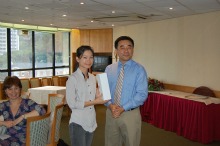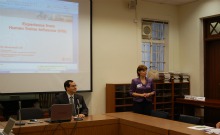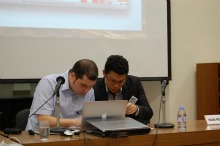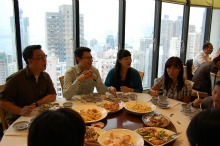VOA Workshop on Disaster Preparedness and Influenza

Hong Kong, Hong Kong University
Summary
VOA organized a workshop for journalists from Hong Kong, Macau and mainland China to report on avian and pandemic influenza. The sessions provided the most up-to-date information about virus, prevention of infection, symptoms of influenza and treatment and care of sick people. In addition, trainees delved into subjects including reporting on crises such as natural disasters and the role of media in raising public awareness in disasters.
Training for 17 journalists from English and Chinese language media organizations was conducted on 18-20 September 2011, on campus of the Hong Kong University, which is often called “Cambridge of Asia.” The workshop’s working languages were English and Chinese, with consecutive and simultaneous translations as needed.
The workshop was the first VOA-organized training session on health issues for Chinese reporters. Health experts at the two-day event discussed the media’s role and responsibility in providing accurate information in a crisis. The journalists also toured the laboratory of the Influenza Research Center at Hong Kong University’s Pasteur Center.
Content
The training agenda included experts’ presentations, Q&As, discussions with journalists, a mock press conference with public health officials, hands-on reporting session, creating a Crowdmap deployment and posting journalists reports, stories and comments to the deployment site: http://voahk2011.crowdmap.com
On Sept. 18, trainees met some speakers and discussed their expectations of the workshop. They also toured the HKU campus and gained familiarity with their lodging and training sites.
On Sept. 19, Kurosh MassoudAnsari, Vice Consul, Economic Affairs, U.S. Consulate in Hong Kong and Macau, opened the event. He underscored the importance of international cooperation in general, and between the United States and China in particular, in addressing global health issues.
The workshop started with session on the “Role of Journalists in Covering Health Issues.” Melinda Frost, leader of the U.S. CDC communications effort in China, who is currently the only U.S. CDC health communication assignee overseas, discussed with trainees how to communicate with the public health officials, and to build trust between media, health organizations and public.

Dr. Yao Mao Chang, Senior Writer, Director, Desk of Medical News, United Daily News, and Assistant Professor, Taipei Medical University, made a presentation on Best Practices for Health Reporting including Health Crises.
At the second session, the workshop participants had an off-the-record discussion with Dr. Liu Shao-Haei, Chief Manager for Infection, Emergency & Contingency at Quality & Safety Division of Hospital Authority, which works in close contact and coordination with the World Health Organization. Dr. Liu is in charge of the Hospital Authority’s emergency services in A&E, ICU, Trauma, Toxicology and Infectious Disease. He oversees the Major Incident Control Center and represents the authority in many inter-departmental meetings for territory-wide emergency response.
At the workshop sessions with Professor Malik Peiris, Scientific Director of the Hong Kong University Pasteur Center; Mike Kilburn, Head of Environmental Strategy at Civic Exchange; Mr. Law Chen Peng, Deputy Director of Phoenix Hong Kong Channel; the workshop participants discussed:
- international cooperation as the world must prepare for the next pandemic influenza outbreak given the global spread of influenza A H5N1;
- ecology, evolution, pathogenesis and the epidemiology of animal and human influenza;
- the media’s role in a public health emergency, including relaying vital information to the public, such as Influenza vaccine efficacy, safety, and access, and how people can reduce their risk of becoming infected with a new influenza strain;
- public health outbreak communication strategy, emphasizing the World Health Organization (WHO)–endorsed commitment to five emergency communication tenets: trust, timely release, transparency, two–way communication, and tie–in to policymakers to ensure the tenets are upheld.
Brian Herbert, a software developer who mapped political unrest and disasters in Africa, made a presentation on adaptation of new technology such as Crowdmap, the Ushahidi platform to collect and map critical health information from people. Ushahidi, which means ”testimony” in Swahili, allows users to gather reports by mobile phone, email and the web – and map them.
In the afternoon, the workshop participants visited the HKU Pasteur Influenza Research Centre and discussed with researchers mutations of the Influenza virus and observed their lab work with pathogens.
On the third day, journalists practiced communicating with the public health officials at the Mock Press Conference Outlining an Earthquake-Tsunami That Triggered Influenza Pandemic. Melinda Frost as Communications Officer, US Embassy Beijing, CDC Section, and Dr. Yao-Mao Chang playing role of health official in the “Republic of Daqiong” where Center for Disease Prevention and Control confirmed an outbreak of the new type of Influenza at the time when “Daqiong” overcomes consequences of devastating earthquake and tsunami. The Mock Press Conference was moderated by Yu Cong Forrest, VOA’s Chinese Branch Health Correspondent.

In addition, journalists had an opportunity to practice their knowledge and skills during a hands-on session. Bonnie Chiu, Senior lecturer at School of Journalism at the Hong Kong Baptist University, Yu Cong Forrest, and Inna Dubinsky, VOA’s Development officer, assisted trainees in use of new media tools as they worked on their reports and stories on topics discussed at the workshop. With Mr. Herbert’s help, they created the Crowdmap deployment and uploaded to the site their workshop stories, reports, comments, and photo gallery of pictures taken at the training venues.
During the afternoon session, there was a group discussion of the produced stories and reports, a peer vote for the best three materials posted by journalists to the Crowdmap deployment in English or Chinese, an award ceremony and workshop graduation.
Workshop Outcome Snapshots
All workshop participants received certificates of graduation signed by the U.S. Consul General in Hong Kong and Macau, and Director of VOA’s Office of Development and International Media Training. The best workshop reports were posted on the VOA Mandarin Service webpage.
Reports and stories produced by all trainees were published on the new Crowdmap deployment voahk2011.crowdmap.com. Photo album of the workshop sessions, mock press conference and field trip to the Pasteur Institute lab was uploaded to the deployment site.

Journalists’ comments on voahk2011.crowdmap.com:
*Gigi Chiu, Media Relations Officer, Macau Government Tourist Office: “I have a few great quotes I’ve jotted down during the workshop and would like to take this opportunity to share:
(1) Public health with an arm’s reach of need (Ms. Melina FROST, Director of Risk Communication of Emergency Preparedness, U.S. CDC)
(2) Reporter is not a recorder and they takes up a role of a watch-dog. (Dr. Yao Mao CHANG, Director of Medical News Desk, United Daily News)
(3) Journalists: Don’t trust the experts unless you know he/she is really an expert. (Mr. Mike Kilbern, Head of Environmental Strategy, Civic Exchange)
(4) There should be a transparent communication amongst government, media & public. (Mr. LAW Cheng Peng, Deputy Director of Phoenix Hong Kong Channel).”
**“I am particularly impressed by the argument of Dr. YaoMao Chang that “reporters are not recorders.” Especially when we are covering disaster preparedness and influenza, we should be quite cautious not to be only the recorder of the government or self-claimed experts”. (Jingrong Fan, Chief Reporter, Shenzhen Special Zone Daily)
***“The expert that impressed me most was Prof. Malik Peiris, who is originally from Sri Lanka and currently working as the director of Hong Kong University Pasteur Center. When I looked at the title of Prof. Malik’s presentation – Ecology, evolution, pathogenesis and the epidemiology of animal and human influenza and other human respiratory viral infections, I believed that this is going to be a very technical presentation and I would be lost in the maze of technical terms. However, I was actually able to follow him as he explained all the technical terms in easy language. I now know better about H1N1 and H5N1”. (Xia Donghua, Independent journalist from Kunming and Media and Communications Advisor, IMPACT).
Speaking of lessons learned at the workshop, Luciana Leitão, Editor of Macau Business, wrote on the deployment site, “Don’t publish rumors, verify your data and make sure your source is legitimate and informed. As a journalist, those are some of the rules you must follow. But sources and officials must facilitate this procedure, releasing correct and transparent information.”
New Media
Internet penetration in China is over 80 percent. As of September 2011, Crowdmap which is Ushahidi platform, is deployed in 132 countries including China. The workshop participants learned to use their new Crowdmap deployment:
* To collect health information via SMS and social media
* To moderate health reports
* To find discrepancies with official information
* To engage public in citizen journalism for healthy communities
* To map outlook and layout of diseases.
Impact
Reporters and editors from major media organizations in China, Macau and Hong Kong participated in the workshop: The Standard (Hong Kong), South China Morning Post (Hong Kong Bureau), Macau Business, Essential Macau, Macau Daily Times, Southern Weekend (Guangzhou), Southern Window (Guangdong Province), Shenzhen Special Zone Daily, China Youth Daily (Beijing), Yunnan Information Daily (Kunming Province).
At the end of the workshop, all 17 participants rated the workshop as a whole: excellent – 25%, very good – 15 %, good – 60%.
In the workshop evaluation forms, they commented:
“I would like more training on using new media as source of information.”
“I enjoyed the hands-on session and talks by Melinda Frost and Dr. Malik Peiris.”
“Courses on technology and business reporting – journalists are always eager to learn.”
“I do hope this kind of workshop can be organized regularly to allow journalists as well as other people working on health issue to meet and learn from each other on a regular basis, and thus to promote a healthy environment for every one of us.”
Melinda Frost, a health communications officer from the Beijing office of the U.S. Centers for Disease Control, said the two-day gathering, “provided participants from a wide variety of news outlets in mainland China, Hong Kong and Macau a broad perspective on the complexities of health emergencies and a glimpse of how to use social media to gain an intimate look at the public’s perspective on health.”
All workshop participants said that they would like to attend other VOA courses.

The Voice of America, which first went on the air in 1942, is a multimedia international broadcasting service funded by the U.S. government through the Broadcasting Board of Governors. VOA broadcasts approximately 1,500 hours of news, information, educational, and cultural programming every week to an estimated worldwide audience of more than 125 million people.
Since 2006, VOA has trained more than 600 journalists around the world on public health information about avian influenza and disaster preparedness. The workshops, funded by the Department of State, have been held in Kazakhstan, India, Bangladesh, Vietnam, Senegal, Togo, Nigeria, Benin, Kenya, South Africa, Haiti, Jamaica, Panama, Argentina and Bolivia.
